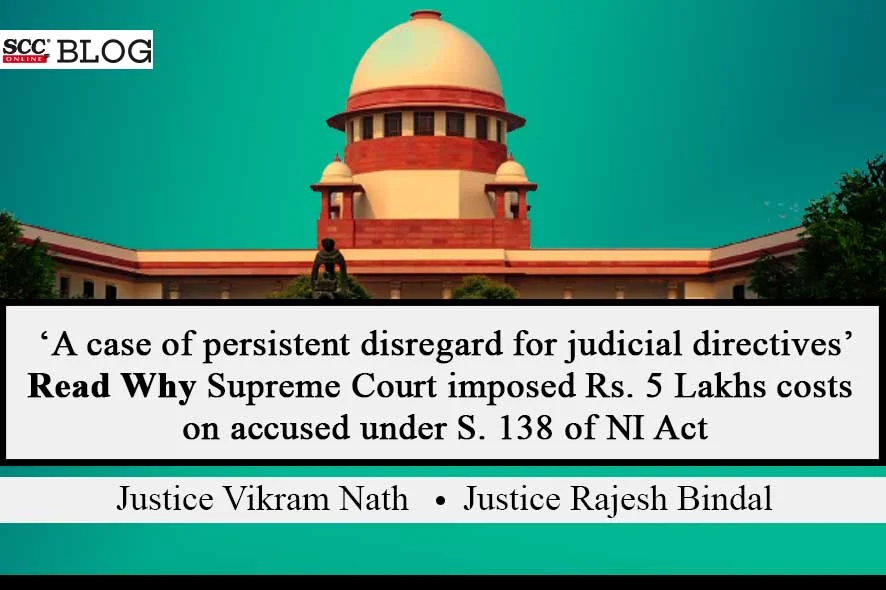Supreme Court: In an appeal against Bombay High Court’s order, whereby, the appellant’s suspension of sentence and grant of bail was cancelled for violating the undertaking given before the High Court for offence under Section 138 of the Negotiable Instruments Act, 1881, the Division Bench of Vikram Nath and Rajesh Bindal, JJ. dismissed the appeal with costs of Rs. 5 Lakhs to be paid to the complainant.
Factual Matrix
In the matter at hand, the appellant and the intervenor were convicted for offence under Section 138 of the Negotiable Instruments Act, 1881 by the High Court in three separate cases and were sentenced to ten months of imprisonment with total liability of Rs.5 crores cumulatively in all the three cases. Appeal was filed before the High Court, which was ultimately dismissed, and a month’s time was granted to surrender to undergo the sentence.
In the appeals before the High Court, the appellant and the intervenor filed an undertaking based on a settlement, according to which it was agreed that a total sum of Rs.4,63,50,000/- would be paid to the complainant. Out of the said amount Rs.73,50,000/- was paid before the appeal Court and the remaining amount of Rs.3,90,00,000/- was to be paid in in installments. It was also mentioned in the settlement that the said amount would be paid equally by the appellant and the intervenor and in default of payment by either of them as per their agreed share in the settlement they would be held liable and would be prosecuted as per law. Based on the said undertaking, the High Court granted interim protection by suspending the imprisonment sentence and they were directed to be released on bail on furnishing a personal bond. The High Court further directed that no further extension shall be granted for payment of the settled amount and fixed 8-10-2018 for reporting compliance. However, full payment was not made until 20-04-2019.
The appellant filed a criminal application before the High Court stating that he had paid his share of Rs. 1,95,00,000/- being 50 percent of Rs.3,90,00,000/- and that, therefore, he may be absolved of the charges and acquitted.
The High Court cancelled the suspension of sentence and bail granted for non-compliance of the undertaking. Hence, the present appeal.
Decision
On perusal of the undertaking given by the appellant and the intervenor, the Court noted that it was apparent that the that the complainant was entitled to receive a total amount of Rs. 4,63,50,000/- and in case of non-compliance they shall be held liable and prosecuted as per law. The Court said that there was no infirmity in the impugned order as the total agreed amount was not paid to the complainant, hence, the interim protection granted by way of bail and suspension of sentence, was rightly cancelled by the High Court. The Court said that the complainant was litigating in this matter since 2007, almost 16 years, and did not reap the benefit of any of the order, moreover, he agreed upon a much lesser amount than he was entitled to.
The Court said that this case bring to light a situation marked by a persistent disregard for judicial directives and a lackadaisical approach to legal and financial obligations. The Court also added that the appellant’s behaviour stood as a testament to how an individual’s nonchalant attitude towards financial responsibilities and Court orders can undermine the essence of judicial efficacy.
Therefore, the Court dismissed the appeal with costs of Rs. 5 Lakhs to be paid to the complainant within four weeks from the date of Judgment. The Court also clarified that this amount of costs will not be adjusted against the compensation awarded to the complainant but will be in addition to it. The appellant and the intervenor were directed by the Court to surrender within four months from the date of Judgment to undergo their sentence.
[Satish P. Bhatt v. State of Maharashtra, 2024 SCC OnLine SC 16, Decided on: 03-01-2024]







Ego and intolerance of the Judges to hear and understand the merits and demerits of the cases leading to the mis carriage of Justice